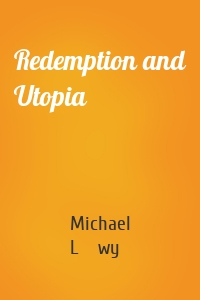Michael Löwy
4 кн.
Redemption and Utopia
Classic study of Jewish libertarian thought, from Walter Benjamin to Franz Kafka Towards the end of the nineteenth century, there appeared in Central Europe a generation of Jewish intellectuals whose work was to mark modern culture. Drawing at once on the traditions of German Romanticism and Jewish messianism, their thought was organized around the cabalistic idea of the ‘tikkoun’: redemption. Redemption and Utopia uses the concept of ‘elective affinity’ to explain the surprising community of...
| Автор | Michael Löwy |
Georg Lukacs
The philosophical and political development that converted Georg Lukács from a distinguished representative of Central European aesthetic vitalism into a major Marxist theorist and Communist militant has long remained an enigma. In this absorbing scholarly study, Michael Löwy for the first time traces and explains the extraordinary mutation that occurred in Lukács's thought between 1909 and 1929. Utilizing many as yet unpublished sources, Löwy meticulously reconstructs the complex itinerary...
| Автор | Michael Löwy |
Fire Alarm
This illuminating study of Benjamin’s final essay helps unlock the mystery of this great philosopher. Revolutionary critic of the philosophy of progress, nostalgic of the past yet dreaming of the future, romantic partisan of materialism … Walter Benjamin is in every sense of the word an “unclassifiable” philosopher. His essay “On the Concept of History” was written in a state of urgency, as he attempted to escape the Gestapo in 1940, before finally committing suicide. Michael Löwy argues that...
| Автор | Michael Löwy |
Erlösung und Utopie
Das Verhältnis zwischen jüdischem Messianismus und anarchistischer Utopie ist trotz seiner zahlreichen Berührungspunkte durch eine spannungsreiche Verschiedenheit unterschiedlicher Positionen gekennzeichnet. Es reicht von radikaler Unvereinbarkeit wie bei Gershom Scholem und Gustav Landauer bis hin zu wechselseitiger Befruchtung und Erhellung wie im Fall von Ernst Bloch und Walter Benjamin. Eine mögliche Verbindung dieser Pole steht und fällt mit der Überwindung des traditionellen Gegensatzes...
| Автор | Michael Löwy |





